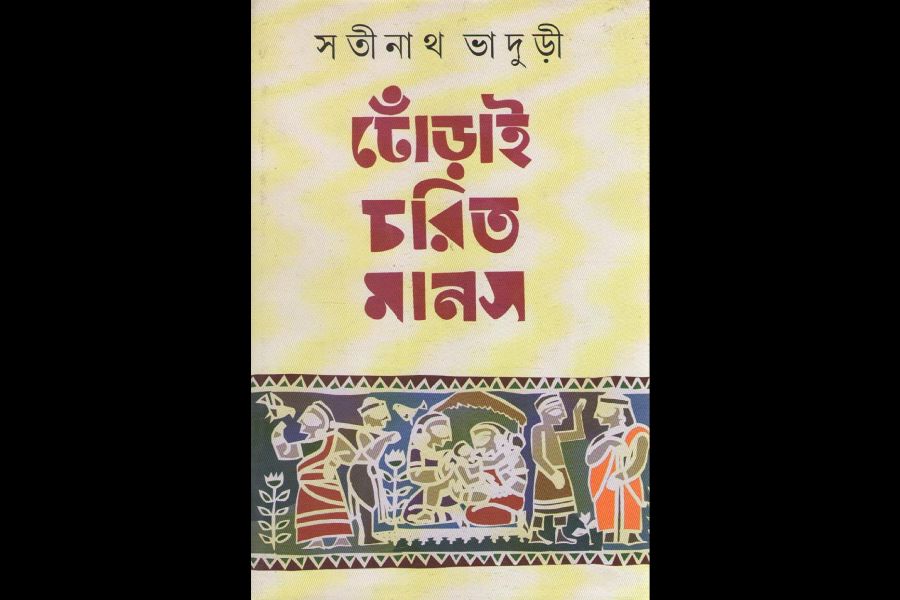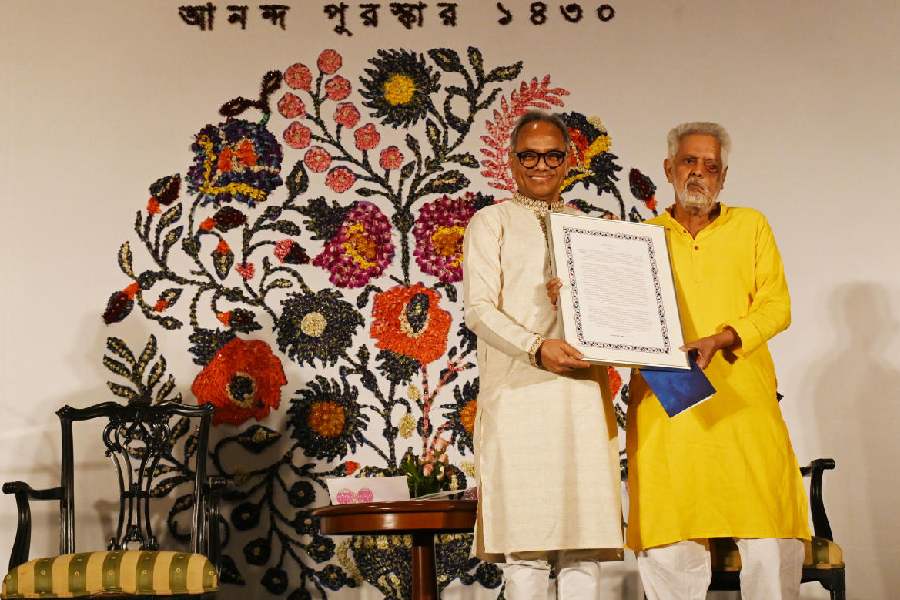“Politicians, by and large, have hypnotised common people. But this state of being spellbound will not last forever, and the masses will wake up.” So says Ashim Chatterjee, 80, former Naxal leader and this year’s Ananda Puraskar awardee. His book Nakshalbarinama has bagged the award for Bengali literature instituted by the ABP Group, publishers of The Telegraph.
Nakshalbarinama, as the writer himself clarifies in the introduction, is not a history of the Naxal movement, nor can it be called an autobiography. What there can be no debate about is that it is a piece of political writing, an insider’s account of the Naxal movement.
In the last 20 years, however, political writing has slowly, steadily ebbed away from Bengali literature. Writings descended from Bankim Chandra Chattopadhyay’s Anandamath (1882), from Ramesh Chandra Dutt’s Maharashtra Jibanprabhat (1871), throbbing with ideas of nationalism and nationalistic pride. “Even Rabindranath Tagore felt compelled to write Ghare Baire (1916),” says Joges Ranjan Pathak, a retired high school teacher.

The cover of Satinath Bhaduri's novel 'Dhorai Charit Manas' The Telegraph
In a lot of pre-Independence political writing, the main theme was colonialism. “Kazi Nazrul Islam channelled his fervour against exploitation into powerful poetry such as Bhangar Gaan, laden with potent political motifs. His verses were so incendiary that many of them were banned by the ruling authorities. Likewise, Sarat Chandra Chattopadhyay, known for his poignant portrayal of the everyday struggles of the lower middle class, suddenly diverged from his usual themes with Pather Dabi (1926), a departure reflecting the urgency of the times,” says Pathak.
Satinath Bhaduri’s Dhorai Charit Manas (1949), a novel about caste and class wars and village politics, is better known, but he also wrote Jagari (1945) wherein a family of four see life in retrospect while serving time as political prisoners in Bhagalpur Central Jail.
Post-Independence, the type of political writings changed — subjects, characters, even tone — but the genre flourished. Writer Sanjib Chattopadhyay observes that post-Independence political Bengali literature predominantly centred on Leftist ideologies. Later, it shifted towards narratives about the Naxal movement. “The spectre of Partition loomed large, influencing the political landscape, and its narratives,” he adds.
But Bengali books of the last decade don’t seem to engage with politics. “Political narratives extend beyond mere discussions of corrupt leaders or specific political strategies; they encompass a vast spectrum of ideas and ideologies. They serve as reflections of society, mirroring the diverse political landscapes,” says Judhajit Dasgupta, who writes on science.
Novelist Shirshendu Mukhopadhyay’s diagnosis is that his ilk today are apprehensive. He says, “There is a constant fear of reprisal, a backlash if one dares to criticise any particular political agenda or any party-oriented stance. Such a political climate tends to choke the creative impulse.” Ullas Mallick, who has been writing since the turn of this century, does not quite agree with this theory. “I’ve personally written quite a few political narratives without facing any backlash,” he asserts.
The online catalogues and the book shop stocks however boast only other trends — detective fiction, biographical writing, romances. Writer Pracheta Gupta acknowledges a scarcity of political literature, but admits he is not sure what could be the exact reason. He poses a poignant question: “Could it be a reluctance to engage with modern-day socio-political issues? And if so, what might be the underlying reasons?”
Bangladeshi novelist and journalist Imdadul Haq Milan, however, adds: “Young authors tend to steer clear of political fiction mainly for two reasons — lack of interest and awareness about the political landscape.”
Ashim Chatterjee, however, refutes the claim. “They are being written. But they are not coming to the forefront. They are not being highlighted,” he says. His theory: there is a need for more literary platforms willing to promote discussions on the political lines.
Something to think about.











